Hearing Voices in Your Head?
Hearing voices in your head refers to experiencing auditory perceptions that originate internally rather than from an external source. These experiences can range from brief, non-distressing occurrences to persistent voices associated with mental health conditions.
Important Clarification: Separating Programmed Narratives from Truth
In this article, like in my other articles and books, you will read two distinct stories. The first is a pre-written, karmically programmed as a part of their Matrix (planetary theater play), and intentionally misleading and false. The second is my personal explanation, non-programmed, out of the Karmic Matrix, honest and true.
One is the false narrative for those trapped in the oblivion of the Matrix. The other is my Voice from the Free World out of the prison of the Karmic Program.
I use AI assistants for gathering, organizing, and presenting data that would take me months to write. After I present their information, I add commentary to expose planned falsehoods and highlight the truth
In the above intro part, there is the first false statement claiming that hearing voices in your head comes from an internal source.
That is not true, voices come from other persons in your vicinity that you don’t see. They are the karmicons, humans from other planets, and servants of the Evil Karmic Organization.
Discover the Truth Behind ‘Hearing Voices: The Surprising Benefits of Reading This Article – Table of Contents
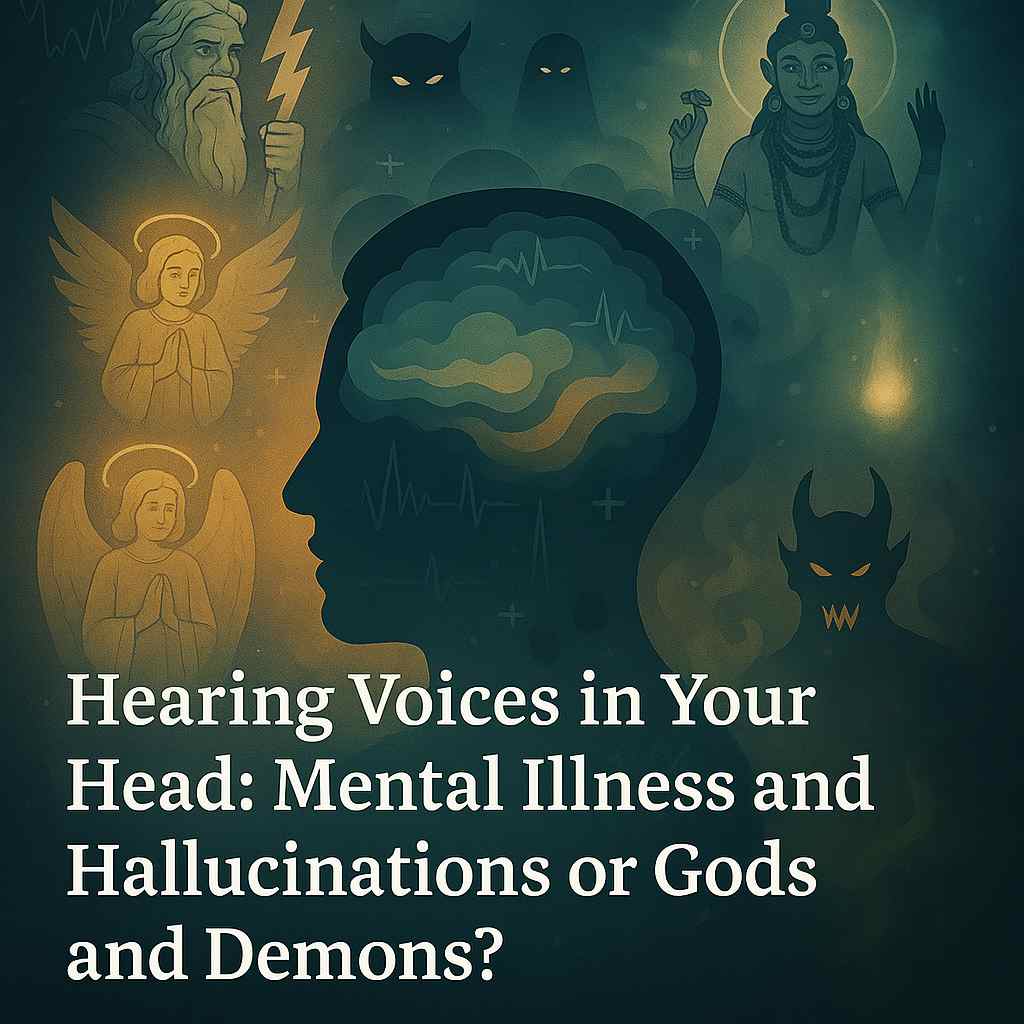
- Hearing voices in your head: The core phenomenon of internally perceived sounds or voices.
- Auditory hallucinations: The clinical term for hearing sounds or voices without an external stimulus, often linked to psychiatric diagnoses.
- Mental illness: A broad category encompassing health conditions like schizophrenia, where hearing voices can be a symptom.
- Spiritual meaning of hearing voices: Interpretations that frame voice hearing as a supernatural or religious experience rather than a disorder.
- Hearing voices without schizophrenia: Non-clinical experiences of voice hearing among individuals without psychiatric diagnoses.
- Hearing voices and anxiety: The connection between anxiety disorders and auditory experiences.
- In the sleep time – Hearing voices during sleep: Specific hallucinations, often hypnagogic, that occur as one falls asleep or wakes.
- Hearing voices after trauma: Voice hearing is linked to past traumatic experiences, including PTSD.
- Healing approaches: Recovery and relief methods can be psychiatric (such as therapy and medications), individual/personal (self-help, coping strategies), or spiritual (faith-based and holistic practices).
Hearing voices in your head is a complex and often misunderstood experience that touches on medical, psychological, and spiritual dimensions. In this article, we explore key definitions and answer important questions to help you understand this phenomenon from multiple perspectives.
TL;DR
Keyword: Hearing Voices in Your Head — Exploring Medical, Spiritual, and Psychological Perspectives is trending for a reason. This article delivers a comprehensive, question-driven guide covering all aspects of voice-hearing.
Top pick: Hearing Voices in Your Head: Mental Illness and Hallucinations or Gods and Demons? expertly bridges clinical, personal, and spiritual insights to redefine understanding of auditory experiences.
Why it matters: This content meets diverse user intents by addressing core definitions, lesser-known explanations, and healing approaches. Furthermore, it presents real-life cases, providing clarity where confusion often reigns.
Importantly, it reveals the Truth behind the false explanation that voices in your head are a mental illness. They are not.
Read time: 30 minutes.
What Is Hearing Voices in Your Head?

Hearing voices in your head refers to the experience of perceiving sounds or spoken words without any external source. These internally perceived voices can vary widely in how they present themselves. Sometimes, they are clear and distinct; other times, vague or fleeting. They often feel as if they come from inside the mind rather than from outside.
This core phenomenon affects many people for different reasons. Some hear voices occasionally and without distress, while others experience persistent voices that may impact daily life. Hearing voices does not automatically mean a person has a mental illness. Instead, it represents a wide spectrum of experiences.
Many people report hearing voices during stressful times or intense emotions. The voices might offer commentary, commands, or even conversations. Understanding hearing voices in your head is the first step to exploring why these experiences happen and what they mean for different individuals.
In summary, hearing voices means internally perceiving sounds or spoken words without an external cause. This experience spans clinical, personal, and spiritual explanations, making it a complex but common human phenomenon.
You must understand that the karmicons, karmic cons, members of the Evil Karmic Organization, programmed our lives and also pre-wrote all articles and books except mine.
That means that they also prepared definitions about voices in your head, as the above ones. The starting premise that voices don’t have an external source is false. Truly, you hear them inside, but they come to your head from outside.
What Are Auditory Hallucinations?
Auditory hallucinations refer to hearing sounds, voices, or noises without any external source or stimulus. In other words, the brain creates these sounds internally, making them seem real to the person experiencing them. Clinically, this phenomenon is often called paracusia.
Auditory hallucinations vary in form. Sometimes, they are clear, formed voices speaking words or sentences. Other times, they manifest as unformed sounds such as music, noises, or cries. These hallucinations can be constant or appear sporadically.
Importantly, auditory hallucinations do not always indicate mental illness. They occur in both psychiatric and non-psychiatric contexts. For example, people with schizophrenia commonly experience them, but healthy individuals might also hear voices during sleep or times of extreme stress.
Several psychiatric conditions feature auditory hallucinations, especially schizophrenia, where about 75% of patients report hearing voices. These voices can range from threatening and abusive to comforting and neutral. Other disorders that can cause auditory hallucinations include bipolar disorder, major depression, and certain personality disorders.
Moreover, neurological issues such as epilepsy, brain tumors, or traumatic brain injuries can also induce auditory hallucinations. Substance misuse and sleep disorders might cause them as well.
Treating auditory hallucinations depends on their cause. Psychiatric conditions often require antipsychotic medication and therapy. For non-psychiatric cases, treatment focuses on the underlying health or neurological issue.
In summary, auditory hallucinations are internally perceived sounds without any external origin. They occur in many contexts and require careful evaluation to determine their cause and appropriate treatment.
It sounds like the author of this explanation claims to know everything about hearing voices but he doesn’t. The brain does not create sounds, voices, or noises; they have an external source and stimulus. These phenomena are created by the Karmicons, humans from higher planets. They produce voices through speech and generate sounds and noises using technological devices. Because they are invisible to most Earthlings, people mistakenly believe the voices originate from their own minds but that is not true.
What Is Mental Illness and How Is It Related to Hearing Voices?
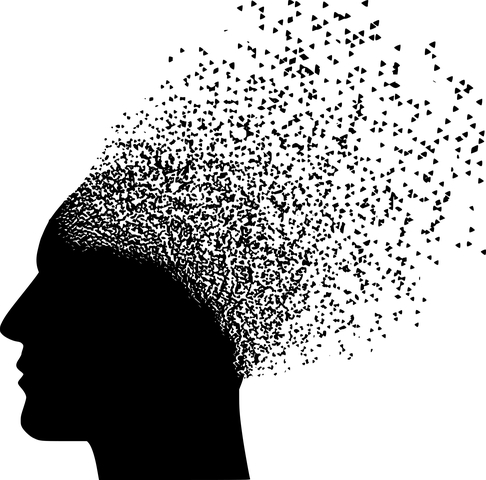
“Mental illness is nothing to be ashamed of, but stigma and bias shame us all.” — Bill Clinton
Mental illness refers to a wide range of health conditions that affect a person’s mood, thinking, and behavior. These conditions can influence how individuals perceive reality, including experiences like hearing voices in the head.
Hearing voices often appears as a symptom in mental illnesses such as schizophrenia, which is the most well-known disorder linked to auditory hallucinations.
Around 75% of people with schizophrenia report hearing voices. However, hearing voices is not exclusive to schizophrenia. Other mental health conditions—like bipolar disorder, severe depression, and post-traumatic stress disorder (PTSD)—may also involve auditory hallucinations.
Mental illness affects the brain’s processing and interpretation of sensory information. This disruption can cause a person to perceive sounds or voices that others do not hear. The voices may be distressing, commanding, or sometimes comforting, depending on the individual’s condition and experience.
It is crucial to recognize that not everyone who hears voices has a mental illness. The presence of voices alone does not constitute a diagnosis. Mental illness typically involves additional symptoms like disorganized thinking, mood changes, impaired functioning, or delusions.
Early diagnosis and treatment can help manage symptoms of mental illness effectively. Treatments include medication, psychotherapy, and support programs tailored to each person’s needs.
In short, mental illness encompasses conditions where hearing voices can serve as a symptom, with schizophrenia being the most prominent example. Understanding the connection helps identify when hearing voices requires professional intervention.
You must know that the Karmicons, the authors of the life scripts we’re forced to live, predetermined all of our conditions, including every illness, even the mental ones. These conditions are artificially created and imposed on the individual to make them suffer mentally and emotionally. In truth, hearing voices in your head is not a mental illness at all. It’s deliberately misrepresented as one.
What Is the Spiritual Meaning of Hearing Voices?
The spiritual meaning of hearing voices frames voice-hearing as a supernatural or religious experience rather than a mental disorder. Many cultures and religious traditions interpret hearing voices as communication from divine or spiritual beings such as God, angels, saints, or spirits.
Spiritual voices often convey messages of guidance, comfort, or personal transformation. These voices usually feel gentle, peaceful, and uplifting, contrasting with the more negative or commanding voices typical of psychiatric auditory hallucinations. For example, many Christian mystics like St. Teresa of Avila described voices as a source of wisdom and spiritual growth.
Importantly, spiritual voice-hearing often brings a sense of peace, meaning, and purpose. People report hearing voices during prayer, meditation, or religious rituals. Such experiences may affirm identity, offer insight, or encourage healing. In some traditions, hearing voices is seen as a sacred gift or vocation.
However, discernment is key. Spiritual traditions caution that not all voices are benevolent; some may be interpreted as demonic or misleading. Genuine spiritual voices tend to inspire growth, humility, and peace, while harmful voices cause agitation or fear.
Many researchers emphasize that it is difficult to draw clear lines between spiritual and psychiatric voices. Voice-hearing experiences can shift between interpretations depending on cultural context and personal beliefs. Still, spirituality can provide important coping resources, offer alternative meanings, and reduce distress for some voice-hearers.
In summary, the spiritual meaning of hearing voices involves interpreting these experiences as divine communication or guidance. This perspective enriches understanding by honoring the profound role spirituality plays for many individuals who hear voices.
Sources:
- Hayward, M., & Denborough, D. (2013). Spirituality and hearing voices: considering the relation. Psychosis, 5(3), 255-265. https://pmc.ncbi.nlm.nih.gov/articles/PMC3827668/
- Corstens, D., Longden, E., & May, R. (2022). Hearing spiritually significant voices: A phenomenological survey. Medical Humanities, 48(3), 273-282. https://mh.bmj.com/content/48/3/273
- Understanding Voices. Voices and Spirituality. https://understandingvoices.com/exploring-voices/voices-and-spirituality/
- Intervoice. Voices as a Gift. https://www.intervoiceonline.org/voices-visions/voices-as-a-gift
Supposedly, spiritual voices are good and harmful voices are bad. But what would you say if I told you that the Karmicons are the authors of both? They play the good ones and the bad ones—because they are all the voices there are. In the morning, they’ll curse you. By afternoon, they’ll offer advice on how to deal with the “bad” voices in your head.
The Karmicons aren’t gifts—they’re a menace. Even when they help you with something, it’s only because that help is written into your incarnational script. If the script said they should torture you with electric shocks, they’d do it with the same enthusiasm.
Gods and angels, Satan and demons—do you see the pattern of dual symmetry? They don’t exist. The Karmicons play those roles too. In the morning, they’re gods. In the evening, they’re demons. All day, they are Evil.
What Does Hearing Voices Without Schizophrenia Mean?
Hearing voices without schizophrenia refers to auditory experiences in people who do not have a psychiatric diagnosis. These non-clinical voice-hearing experiences occur among healthy individuals or those facing stressful situations, trauma, or other life challenges.
Studies show that approximately 10-15% of the general population hear voices at some point without meeting criteria for schizophrenia or other psychotic disorders. These voices often do not cause distress or impairment and may even feel neutral or positive.
People who hear voices without schizophrenia might experience them during sleep (such as hypnagogic hallucinations), intense stress, or grief. Some describe voices as supportive, guiding, or simply part of their internal dialogue. Others report hearing voices during meditation or creative activities.
It is important to recognize that hearing voices alone does not indicate mental illness. Non-clinical voice hearing differs from psychiatric symptoms by its lack of disruption to daily functioning and emotional well-being.
Researchers call these experiences non-psychotic voice hearing. Awareness of this phenomenon challenges stigma and broadens understanding of what it means to hear voices. It also highlights the diversity of human consciousness and perception.
In summary, hearing voices without schizophrenia describes normal or non-clinical voice-hearing experiences found in a significant portion of the population. These voices often occur in everyday contexts and do not necessarily require clinical intervention.
Sources:
- Johns, L. C., & van Os, J. (2001). The continuity of psychotic experiences in the general population. Clinical Psychology Review, 21(8), 1125-1141. https://doi.org/10.1016/S0272-7358(01)00103-X
- Morrison, A. P., & Barratt, S. (2010). What are auditory hallucinations? Psychosis, 2(1), 37-46. https://doi.org/10.1080/17522430903489333
- Sommer, I. E. C., et al. (2010). Understanding auditory verbal hallucinations: A review of the literature and clinical implications. Schizophrenia Bulletin, 36(4), 842-854. https://doi.org/10.1093/schbul/sbq048
- Corstens, D., Escher, S., McCarthy-Jones, S., & Longden, E. (2014). Emerging Perspectives From the Hearing Voices Movement: Implications for Research and Practice. Schizophrenia Bulletin, 40(Suppl_4), S285-S294. https://doi.org/10.1093/schbul/sbu035
What Is the Connection Between Hearing Voices and Anxiety?
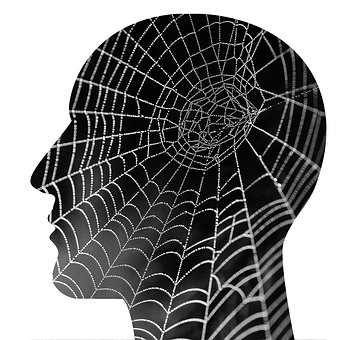
“Anxiety does not empty tomorrow of its sorrows, but only empties today of its strength.” — Charles Spurgeon
Hearing voices and anxiety are often closely linked. Anxiety can trigger or intensify auditory experiences, especially those involving negative or threatening voices. This connection appears in many psychiatric and non-psychiatric contexts.
Anxiety heightens emotional stress, which can influence how the brain processes internal thoughts. Sometimes, anxious anticipation makes certain thoughts feel alien or like voices separate from oneself. For example, someone overwhelmed by worry might start hearing critical or threatening voices reflecting their fears.
Research shows that in mood-related psychosis, anxiety strongly predicts the presence of critical and threatening voice content. These voices often deliver self-critical messages or commands linked to the individual’s anxiety. In contrast, anxiety influences the emotional tone of voices more than their mere occurrence.
Even outside psychiatric diagnoses, severe anxiety can cause psychosis-like symptoms, including hearing voices. Stress and hypervigilance may cause the brain to misinterpret internal thoughts or external sounds as voices. This phenomenon is sometimes called a “hypervigilance hallucination,” where heightened alertness in noisy or stressful environments triggers voice-hearing.
Important Link: Anxiety as an Amplifier of Inner Voices
First-person reports frequently describe voices that insult, threaten, or confirm negative emotions such as shame, fear, and self-doubt. Anxiety fuels the distress caused by these voices, making them feel more real and harder to ignore.
Moreover, anxiety may generate a feedback loop: the more one fears the voices, the louder and more hostile they seem. For some, anxiety triggers voices that echo familial criticism or cultural judgments, especially in highly anxious individuals.
To summarize, anxiety can cause or worsen hearing voices by intensifying negative emotions and creating mental states conducive to auditory hallucinations. Recognizing this link is vital for diagnosing and treating voice hearing, especially where anxiety plays a central role.
Sources:
- McCarthy-Jones, S., et al. (2020). The relationship between anxiety and voice content in affective psychosis. Journal of Affective Disorders. https://pubmed.ncbi.nlm.nih.gov/33070107/
- Alderwick, H., & Larøi, F. (2015). How anxiety induces verbal hallucinations. PMC. https://www.ncbi.nlm.nih.gov/pmc/articles/PMC4710580/
- AnxietyCentre. Anxiety Hallucinations. https://www.anxietycentre.com/anxiety-disorders/symptoms/anxiety-hallucinations/
- Montare Behavioral Health. Can My Anxiety Cause Hallucinations? https://montarebehavioralhealth.com/blog/can-my-anxiety-cause-hallucinations/
What Does Hearing Voices During Sleep Mean?
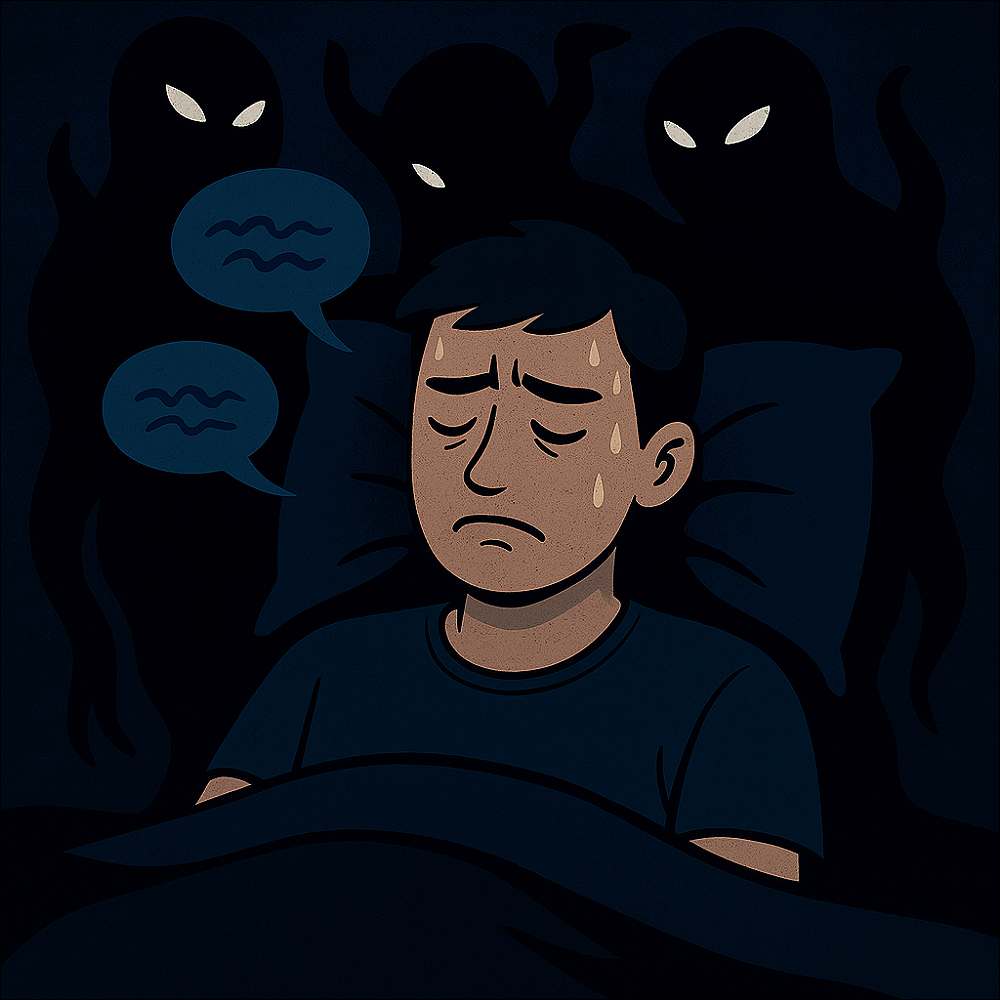
Hearing voices during sleep refers to auditory experiences that occur as a person falls asleep or wakes up. These voices are usually part of hypnagogic or hypnopompic hallucinations, which happen at the boundary between wakefulness and sleep.
Hypnagogic hallucinations occur while falling asleep, and hypnopompic hallucinations happen upon waking. Both types can involve hearing voices, sounds, music, or even seeing images. These experiences are typically vivid but short-lived and often feel very real.
Many people experience hypnagogic voice hearing without any mental health disorder. It affects up to 37% of the general population at some point in their lives. These hallucinations can intensify during periods of sleep deprivation, stress, or irregular sleep schedules.
The voices heard during sleep tend to be brief and may consist of words, phrases, or indistinct sounds. They often do not cause distress unless frequent or disturbing. In some cases, they can overlap with sleep paralysis, a condition where the body is temporarily unable to move while the mind is conscious, sometimes accompanied by frightening hallucinations.
Hypnagogic and hypnopompic hallucinations result from the brain shifting between sleep and wake states. During these transitions, sensory information can mix, producing illusions like hearing voices.
In summary, hearing voices during sleep is a common experience related to hallucinations at sleep onset or upon waking. These auditory phenomena usually occur without underlying mental illness and often resolve with healthy sleep habits.
Sources:
- Ohayon, M. M., & Shapiro, C. M. (2000). Hypnagogic and hypnopompic hallucinations: Characteristics and associations in the general population. Neurology, 54(3), 582-588. https://doi.org/10.1212/WNL.54.3.582
- Cheyne, J. A., et al. (1999). Hypnagogic and hypnopompic hallucinations: Neurological and psychological aspects. Sleep Medicine Reviews. https://doi.org/10.1053/smrv.1999.0067
- Sleep Foundation. What Are Hypnagogic Hallucinations? https://www.sleepfoundation.org/sleep-disorders/hypnagogic-hallucinations
- National Sleep Foundation. Sleep Paralysis and Related Phenomena. https://www.sleepfoundation.org/how-sleep-works/sleep-paralysis
What Does Hearing Voices After Trauma Mean?
“The wound is the place where the Light enters you.” — Rumi
This is a typical karmic quote praising Evil, violence, and suffering as something good and even necessary for human life. It is just another nasty lie. Truly, the wound is the place where the Darkness enters you.
Hearing voices after trauma refers to experiencing auditory sensations that often connect directly to past traumatic events. These voices may reflect memories, emotions, or messages related to the trauma. This experience commonly occurs in people diagnosed with post-traumatic stress disorder (PTSD).
Voice hearing linked to trauma can take many forms. Some hear voices that replay abusive or threatening messages from their past. Others might experience voices expressing fear, guilt, or anger tied to unresolved trauma. Unlike voices caused primarily by psychotic disorders, trauma-related voices usually relate clearly to the individual’s history.
Research indicates that up to 34% of people with PTSD experience hearing voices. Trauma affects brain regions involved in memory and emotional regulation, increasing susceptibility to auditory hallucinations. Childhood trauma, especially, shows a strong connection to voice hearing later in life.
These voices can cause significant distress but are often responsive to trauma-focused therapies such as cognitive behavioral therapy (CBT) or eye movement desensitization and reprocessing (EMDR). Understanding the trauma link helps clinicians tailor treatments and avoid misdiagnosis.
In summary, hearing voices after trauma describes auditory experiences connected to traumatic events and PTSD. Recognizing these voices as part of trauma recovery supports healing and more effective care.
Sources:
- Hardy, A., & Brewin, C. R. (2018). Hearing voices: The significance of trauma history. Psychological Medicine. https://doi.org/10.1017/S0033291718000077
- McCarthy-Jones, S., et al. (2014). Trauma and hallucinations: A review of research. Psychological Trauma: Theory, Research, Practice, and Policy. https://doi.org/10.1037/a0036751
- Brewin, C. R., & Patel, T. (2020). Hearing voices and PTSD: Research insights. Journal of Trauma & Dissociation. https://doi.org/10.1080/15299732.2020.1815004
- National Institute of Mental Health. Post-Traumatic Stress Disorder (PTSD). https://www.nimh.nih.gov/health/topics/post-traumatic-stress-disorder-ptsd
What Are Healing Approaches for Hearing Voices?
“Healing takes courage, and we all have courage, even if we have to dig a little to find it.” — Tori Amos
Healing from hearing voices involves different methods depending on the person’s needs and beliefs. Recovery and relief strategies generally fall into three main categories: psychiatric, individual/personal, and spiritual approaches. Each type offers unique tools to help manage or make sense of voice-hearing experiences.
Psychiatric Healing Approaches: Therapy and Medications

Psychiatric healing approaches focus on treating the underlying mental health conditions linked to hearing voices. These methods often include psychotherapy and medications.
Antipsychotic medications remain the most common treatment for voice hearing associated with disorders like schizophrenia. These drugs help reduce the frequency and intensity of auditory hallucinations by balancing brain chemicals.
At the same time, various forms of therapy provide coping skills and emotional support. Cognitive Behavioral Therapy for Psychosis (CBTp) helps individuals challenge distressing voice content and improve their relationship with the voices. Other therapies, such as Acceptance and Commitment Therapy (ACT), focus on mindfulness and acceptance.
Psychiatric approaches emphasize symptom management and improving quality of life. With the right treatment, many voice hearers experience significant relief and regain daily functioning.
This is just another dark karmic joke because hearing voices in your head is not a mental illness, and there is no cure for it. At the end of the article, I will reveal the truth about the voices in head. Moreover, I will tell you what to do if you hear them.
Individual and Personal Healing Approaches: Self-help and Coping Strategies
Many people use individual or personal healing approaches to manage hearing voices alongside or independently of formal treatment. These strategies emphasize empowerment and self-care.
Common methods include journaling thoughts and voice content, developing distraction techniques, and practicing relaxation exercises like deep breathing or meditation. Establishing a routine, getting sufficient sleep, and reducing stress also help minimize voice distress.
Support groups and peer-led programs provide a sense of community. Hearing voices forums and networks allow people to share experiences and coping tips, reducing feelings of isolation.
Personal approaches encourage individuals to build their own understanding of voices and find ways to live well despite them.
Spiritual Healing Approaches: Faith-Based and Holistic Practices
Spiritual healing approaches address hearing voices through faith, meaning, and holistic health. Many people find comfort and guidance in religious or spiritual practices.
Prayer, meditation, and ritual can provide soothing frameworks to interpret or integrate voice experiences. Some view voices as messages from a higher power or spiritual guides, which gives them purpose and reduces fear.
Holistic practices such as yoga, energy healing, or mindfulness contribute to overall wellbeing and emotional balance. Spiritual counseling or pastoral care offers compassionate support tailored to religious beliefs.
This approach helps those who experience voices as part of their spiritual life and seek healing in a faith-based context.
In conclusion, healing approaches to hearing voices are diverse and personalized. Psychiatric treatments address clinical symptoms, individual strategies empower self-management, and spiritual practices provide meaningful interpretation and comfort. Combining these methods can support holistic recovery and wellbeing.
Sources:
- National Institute of Mental Health. Treatment of Schizophrenia. https://www.nimh.nih.gov/health/topics/schizophrenia/raise
- Pearce, M., et al. (2017). Effectiveness of cognitive-behavioral therapy for psychosis: A meta-analysis. Schizophrenia Research. https://doi.org/10.1016/j.schres.2017.07.034
- Intervoice. Approaches to Hearing Voices. https://www.intervoiceonline.org/hearing-voices/
- Corstens, D., et al. (2012). Developing the Hearing Voices Network. Psychosis. https://doi.org/10.1080/17522439.2012.677799
- Koenig, H. G. (2012). Religion, spirituality, and mental health. Indian Journal of Psychiatry. https://doi.org/10.4103/0019-5545.104819
Statistical Overview of Hearing Voices Experiences
This section presents clear, concise statistics on voice-hearing from clinical, non-clinical, and religious perspectives. The data underscores the complexity and diversity of auditory experiences across different populations.
Auditory Hallucinations in Psychiatric Populations: Table
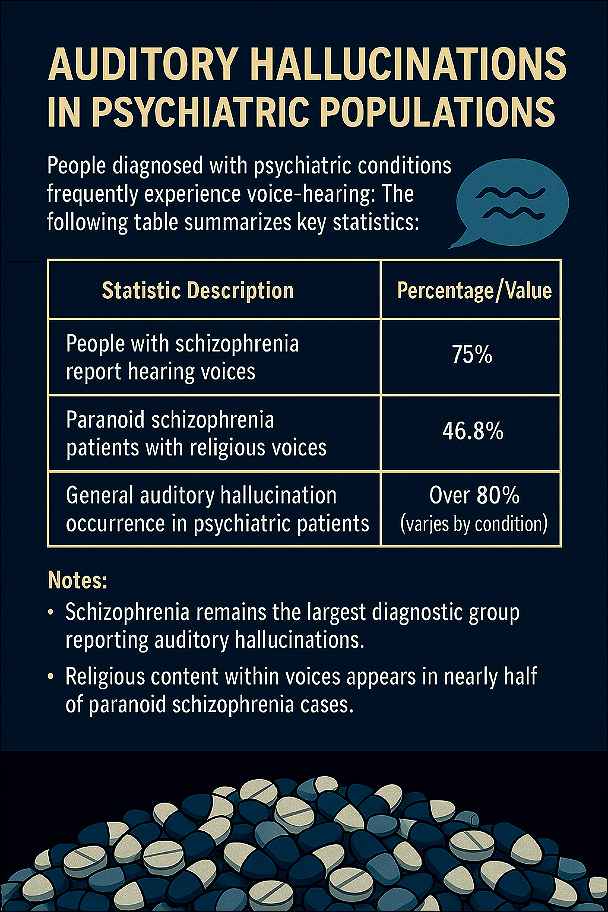
People diagnosed with psychiatric conditions frequently experience voice-hearing. The following table summarizes key statistics:
| Statistic Description | Percentage / Value |
|---|---|
| People with schizophrenia report hearing voices | 75% |
| Paranoid schizophrenia patients with religious voices | 46.8% |
| General auditory hallucination occurrence in psychiatric patients | Over 80% (varies by condition) |
Notes:
- Schizophrenia remains the largest diagnostic group reporting auditory hallucinations.
- Religious content within voices appears in nearly half of paranoid schizophrenia cases.
Auditory Hallucinations in Non-Psychiatric Populations
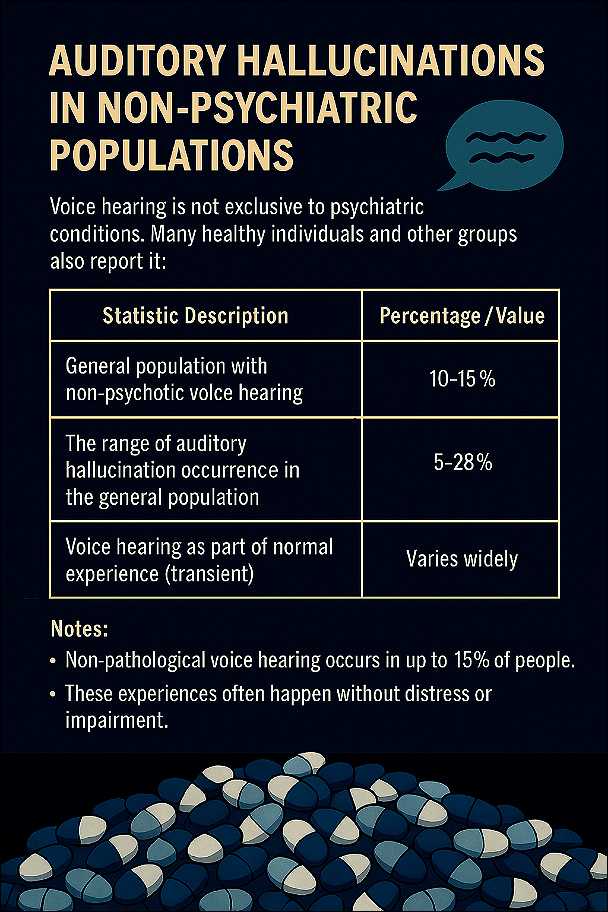
Voice hearing is not exclusive to psychiatric conditions. Many healthy individuals and other groups also report it:
| Statistic Description | Percentage / Value |
|---|---|
| General population with non-psychotic voice hearing | 10-15% |
| The range of auditory hallucination occurrence in the general population | 5-28% |
| Voice hearing as part of normal experience (transient) | Varies widely |
Notes:
- Non-pathological voice hearing occurs in up to 15% of people.
- These experiences often happen without distress or impairment.
Religious and Spiritual Voice-Hearing Experience Statistics
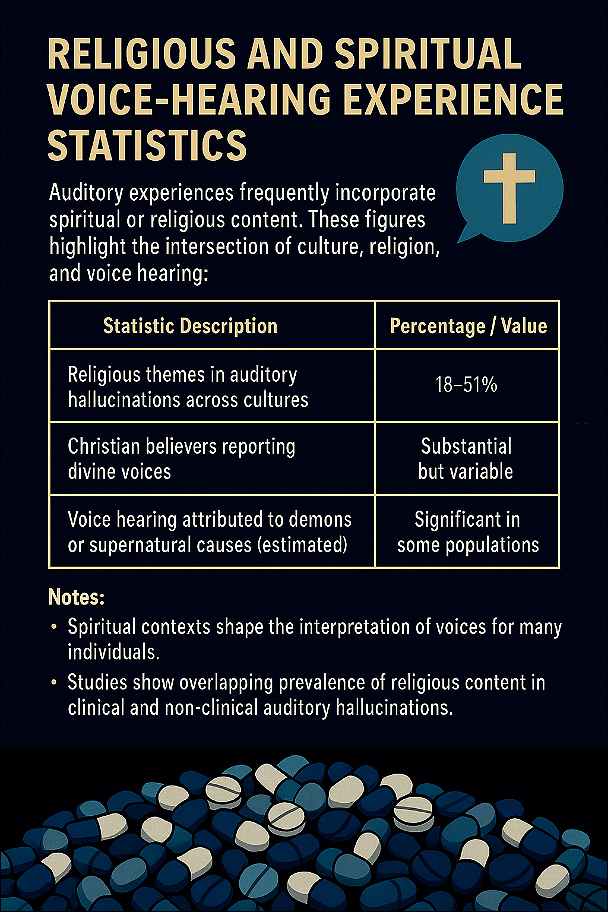
Auditory experiences frequently incorporate spiritual or religious content. These figures highlight the intersection of culture, religion, and voice hearing:
| Statistic Description | Percentage / Value |
|---|---|
| Religious themes in auditory hallucinations across cultures | 18-51% |
| Christian believers reporting divine voices | Substantial but variable |
| Voice hearing attributed to demons or supernatural causes (estimated) | Significant in some populations |
Notes:
- Spiritual contexts shape the interpretation of voices for many individuals.
- Studies show overlapping prevalence of religious content in clinical and non-clinical auditory hallucinations.
Sources for Statistical Data
- McCarthy-Jones, S. (2019). Hearing Voices: Phenomenology, Impact, and Implications for Therapy. Schizophrenia Bulletin. https://doi.org/10.1093/schbul/sbz051
- Waters, F., Woods, A., & Fernyhough, C. (2014). Hearing Voices and Other Psychotic Symptoms: A Review of Psychosocial Intervention and Management Strategies. British Journal of Psychiatry. https://doi.org/10.1192/bjp.bp.112.120164
- Larøi, F., & Aleman, A. (2016). The Phenomenology of Auditory Verbal Hallucinations: Recent Advances. Schizophrenia Research: Cognition. https://doi.org/10.1016/j.scog.2016.07.003
- Luhrmann, T. M. (2014). Hallucinations and Cultural Context: A Review from Anthropology. Schizophrenia Bulletin. https://doi.org/10.1093/schbul/sbs141
- Nayani, T. H., & David, A. S. (1996). The auditory hallucination: A phenomenological survey. Psychological Medicine. https://doi.org/10.1017/S0033291700033496
These sources, dated from the last decade, provide robust, peer-reviewed data that support this statistical overview and underscore the broad spectrum of voice-hearing experiences across populations.
What Are Some Lesser-Known Explanations of Hearing Voices in Your Head?

Hearing voices has fascinated humans across history and cultures. Beyond the familiar medical and spiritual views, there exist primitive superstitious beliefs, philosophical interpretations, and psychoanalytic theories. Each offers a unique lens for understanding this mysterious experience.
What Were Primitive Superstitious Explanations and Practices?
Primitive societies often explained hearing voices through superstition and magical thinking. Early humans lacked scientific understanding and attributed strange auditory experiences to spirits, witches, or curses. They believed voices came from outside forces with power over life and death.
For example, some feared witches who could steal parts of bodies or souls to enhance their magic. Others saw voices as messages from ancestors, nature spirits, or enemies possessing malevolent mana—a supernatural force. Protective rituals, charms, and taboos aimed to ward off evil voices or their harmful effects.
These beliefs arose from attempts to explain dangerous, confusing phenomena in harsh, unpredictable environments. The imagination and fear amplified the meaning of voice hearing, turning it into a sign of spiritual attack, retribution, or divine warning.
Primitive customs included guarding corpses against witches, purifying soldiers after battle to remove “contagious” negative mana, and performing ritual incantations to control spirits believed responsible for voices.
In short, primitive superstitious explanations framed hearing voices as manifestations of external supernatural forces. They combined fear, magic, and symbolic acts to make sense of these experiences in early human societies.
What Does the Philosophical Explanation of Hearing Voices in Your Head Involve?
Philosophers have long debated the nature of consciousness, perception, and inner speech — all relevant to hearing voices. Some philosophical views consider voice hearing as part of the mind’s complex representational and interpretative processes.
From this perspective, voices are phenomena reflecting the self’s fragmented or dialogic nature. Hearing voices may illustrate the mind’s capacity to entertain multiple perspectives internally, engaging in an inner conversation or conflict.
Philosophical inquiry questions what it means to “hear” and where the boundary lies between internal thought and external reality. It challenges assumptions about selfhood, agency, and the origin of experience.
Overall, the philosophical explanation frames hearing voices less as a symptom or spiritual event and more as a window into the workings of human consciousness and identity.
What Is the Psychoanalytic Approach to Hearing Voices in Your Head?
The psychoanalytic approach interprets hearing voices as manifestations of unconscious conflicts, desires, or traumas. Sigmund Freud viewed hallucinations, including voices, as symbolic expressions of repressed material surfacing to consciousness.
According to Freud, voices serve as projections of internal emotional states or unresolved Oedipal or primal conflicts. Therapy involves uncovering these unconscious meanings through free association and dream analysis to reduce distress.
Jacques Lacan expanded this view, emphasizing language’s role and the “Other” in shaping identity. He described voices as part of the fragmented self attempting to communicate through symbolic language. Lacanian therapy focuses on how voice hearing relates to the structure of subjectivity and desire.
Psychoanalytic therapy helps patients interpret voices as meaningful psychic phenomena rather than random symptoms. It supports exploring the personal and symbolic content behind voice hearing for insight and healing.
In summary, the psychoanalytic approach sees voices as rich psychological symbols rooted in unconscious life, addressed through talk therapy and symbolic interpretation.
What Are Some Unusual or Alternative Explanations?
Beyond these frameworks, some unusual explanations exist. These include theories linking voice hearing to:
- Quantum consciousness or altered brain states beyond current scientific understanding.
- Extra-sensory perception (ESP) or communication with entities outside ordinary reality.
- Technological interference, such as electromagnetic fields affecting brain function (speculative).
- Cultural or literary metaphor, where voices symbolize inner turmoil or creativity rather than literal sounds.
While these remain on the fringe of mainstream science, they reflect humanity’s ongoing curiosity about the mind’s mysteries.
These lesser-known perspectives enrich the wider conversation about hearing voices. They remind us that this experience transcends simple categorization and touches on fundamental questions of human nature, culture, and belief.
Sources:
- Lane, E. W. (1916). Taboo, Magic, Spirits: A Study of Primitive Elements. Sacred Texts Archive. https://sacred-texts.com/cla/tms/tms03.htm
- Freud, S. (1953). The Uncanny. Standard Edition, 17.
- Lacan, J. (1977). Écrits: A Selection. Norton.
- Corstens, D., Longden, E., & May, R. (2012). Emerging perspectives from the hearing voices movement. Psychosis, 4(2), 95–104. https://doi.org/10.1080/17522439.2011.618910
- Beyond OCD. Excessive Superstition in Cases of OCD. https://beyondocd.org/expert-perspectives/articles/very-superstitious
Quick-Glance Table: Diverse Perspectives on Hearing Voices in Your Head
| Perspective | Key Point | Example |
|---|---|---|
| Medical/Psychiatric | Symptoms of mental illness | Schizophrenia, PTSD |
| Spiritual/Religious | Divine or supernatural communication | Prophets, mystics |
| Personal/Nonclinical | Normal, non-illness phenomena | Grief, meditation, stress |
| Cultural/Primitive | Magical, supernatural explanations | Witches, curses |
| Psychoanalytic | Unconscious conflict or desire | Freud, Lacan |
Cases of Murders Caused by Voices in the Head

This section presents three documented cases where perpetrators claimed that voices in their heads or divine commands led them to commit murders. These real-life examples illustrate the tragic consequences that sometimes arise when auditory hallucinations intersect with violent actions.
“Voice Told Me To Kill Them” — Paul Michael Stephani, Minnesota, USA
Paul Michael Stephani (1944–1998), known as the “Weepy-Voiced Killer,” murdered at least three women in the Minneapolis–Saint Paul area between 1980 and 1982. During and after his attacks, Stephani made multiple phone calls to the police in a remorseful, high-pitched voice.
In one call, after stabbing a victim, he pleaded: “God damn, will you find me? I just stabbed somebody with an ice pick, I can’t stop myself, I keep killing somebody.” Stephani reported an uncontrollable urge, suggesting voices or impulses drove his crimes. His mental anguish and the “voices” in his head were a recurring theme during police communications.
Stephani later confessed to several murders and attempted murders before dying from skin cancer in prison. His case remains a stark example of voice hearing linked to violent crime.
Source: Paul Michael Stephani – Wikipedia
“God Told Me To Kill Him” — Valdo Calocane, United Kingdom
Valdo Calocane was convicted in the UK in 2024 for multiple murders and attempted murders committed in 2023. During psychiatric evaluations, Calocane was diagnosed with paranoid schizophrenia. Experts agreed he experienced an abnormality in mental functioning caused by hearing voices in his head commanding him to act.
He believed his family faced danger if he did not obey these voices telling him to kill. This delusional belief system led to impaired self-control and severe violence.
While Calocane pleaded guilty to manslaughter on grounds of diminished responsibility, his case highlights how commanding voices perceived as divine can lead to fatal outcomes.
Source: Man sentenced for killing of three people and attempted murder of three others – CPS
“Satan Told Me To Kill Him” — Richard Chase, California, USA
Richard Chase (1950–1980), known as the “Vampire of Sacramento,” was a serial killer who murdered six people in California in 1977. He suffered from severe mental illness and claimed to hear voices, including those he interpreted as satanic or demonic commands.
Chase believed that Satanic voices told him to kill and drink the blood of his victims to prevent his own death. His delusions and auditory hallucinations led to brutal murders marked by extreme violence and ritualistic behavior.
He was arrested, found legally insane, and died by suicide in jail in 1980. Chase’s case is a chilling example of how perceived demonic voices have influenced murderous actions.
Source: Richard Chase – Wikipedia
These cases show different ways auditory hallucinations and perceived supernatural commands have contributed to violent crimes. They emphasize the critical importance of early diagnosis, treatment, and careful assessment of individuals hearing distressing or commanding voices.
Personal and Cultural Perspectives on Hearing Voices
First-Person Narratives: Voices From Lived Experience
Hearing voices takes many forms, and first-person accounts reveal the diversity and depth of these experiences:
- “The voices started when I lost my father. Mostly, they were comforting, like someone reminding me to stay strong. Sometimes, I still hear him say ‘keep going, I’m here.’” — Anonymous
- “My voices are not always pleasant. One tells me I’m not good enough, especially when I’m anxious. I’ve learned to challenge it, to talk back and take away its power.” — Anonymous
- “During meditation, I often hear what I call my ‘guides.’ They give advice or simply offer reassurance that I’m on the right path. This has become a positive part of my spiritual life.” — Anonymous
These stories underscore that voice hearing can be comforting, distressing, or neutral, and that people find unique ways to relate to their voices.
Insights on Stigma: Barriers and Advocacy
Misconceptions and stigma about hearing voices persist in society, often leading to isolation, discrimination, and reluctance to seek help:
- Common misconceptions:
- Hearing voices means someone is “dangerous” or “crazy.”
- All voice-hearing is a sign of severe mental illness.
- People who hear voices cannot function in society.
- Impact of stigma:
- Delayed or avoided treatment due to fear of judgment.
- Social withdrawal and secrecy, increasing distress.
- Reduced employment and community opportunities.
- Advocacy and support:
- The Hearing Voices Movement and networks worldwide challenge stigma, focusing on acceptance and peer support.
- Awareness campaigns stress that voice hearing is more common and diverse than often assumed.
- Mental health organizations highlight recovery stories and encourage open dialogue to reduce prejudice.
“The greatest barrier to recovery is not the illness itself, but the stigma surrounding it.” — Patrick Corrigan
Non-Western Views: Global Cultural Interpretations
Attitudes toward hearing voices can vary significantly across cultures:
- Indigenous and shamanic traditions:
Many Indigenous peoples across the Americas, Australia, and Siberia regard voice hearing as a form of spiritual communication or shamanic calling. Such experiences can mark a person as gifted, destined to become a healer or intermediary with the spirit world. - African perspectives:
In several African cultures, hearing voices may be attributed to ancestors, spirits, or witchcraft—sometimes viewed as an honor, sometimes as a sign of imbalance requiring ritual intervention. Community elders or traditional healers often play a key role in interpreting and addressing the experience. - Asian cultural context:
In some South and East Asian traditions, hearing voices has been interpreted as communication with deities, the dead, or as residual karma from past lives. Practices such as rituals, meditation, and consultation with spiritual leaders are often used to manage or embrace these experiences.
These non-Western views reveal that hearing voices is not universally pathologized and may hold valued meanings within various cultural frameworks.
Corin, E. (1996). The cultural matrix of healing: Negotiating meaning across cultures. Transcultural Psychiatry, 33(2), 139–163.
Sorsdahl, K., et al. (2009). Traditional healers in the treatment of common mental disorders in South Africa. The Journal of Nervous and Mental Disease, 197(6), 434–437.
Patel, V., & Prince, M. (2010). Global mental health: A new global health field comes of age. JAMA, 303(19), 1976–1977.
FAQ: Hearing Voices in Your Head
1. What does it mean to hear voices in your head?
Hearing voices in your head refers to the experience of perceiving sounds or speech without an external source. This can range from clear voices or commands to vague whispers, and is often a deeply personal experience that varies in intensity and meaning.
2. Are auditory hallucinations always a sign of mental illness?
No. While auditory hallucinations are often associated with psychiatric diagnoses like schizophrenia, they can also occur in healthy individuals, during transitions between sleep and wakefulness, under extreme stress, or after trauma. Not every person who hears voices has a mental illness.
3. Which mental health conditions are most commonly linked to hearing voices?
Schizophrenia is most strongly associated with hearing voices, with up to 75% of patients experiencing this symptom. Voices can also appear in conditions such as bipolar disorder, severe depression, and PTSD.
4. Can hearing voices have a spiritual meaning?
Yes. Many religious and spiritual traditions interpret voice-hearing as communication from divine beings, spirits, or ancestors. In these contexts, the voices are often described as guiding, comforting, or carrying special messages.
5. Is it normal to hear voices without having schizophrenia?
Yes. Research suggests that 10–15% of the general population may hear voices at some point, even without meeting criteria for any psychiatric diagnosis. These non-clinical experiences are often benign and do not interfere with daily life.
6. How are anxiety and hearing voices connected?
Anxiety can trigger or amplify voice-hearing, especially when voices are critical, threatening, or reflect personal fears. In high states of stress or anxiety, internal thoughts may be perceived as external voices, sometimes called hypervigilance hallucinations.
7. Is it common to hear voices when falling asleep or waking up?
Yes. Many people experience hypnagogic (falling asleep) or hypnopompic (waking up) hallucinations. These brief, vivid experiences can include hearing voices, and are generally considered normal unless they cause significant distress.
8. How does trauma relate to hearing voices?
Traumatic experiences, especially in childhood, can increase the likelihood of hearing voices later in life. In people with PTSD, up to one-third may experience trauma-related auditory hallucinations, often linked to memories or emotions from the traumatic event.
9. What are effective healing approaches for hearing voices?
- Psychiatric treatments: Medications (e.g., antipsychotics), therapy (e.g., Cognitive Behavioral Therapy for psychosis)
- Self-help and coping strategies: Journaling, mindfulness, peer support groups, stress reduction
- Spiritual practices: Prayer, meditation, rituals, and guidance from faith leaders
A combined approach tailored to individual needs is often most effective.
10. Did ancient cultures have other explanations for hearing voices?
Yes, early societies explained voice-hearing through superstitions, magic, and supernatural forces, attributing voices to spirits, witches, or curses. They used protective rituals and taboos to manage these experiences.
11. What are the philosophical and psychoanalytic interpretations of hearing voices?
- Philosophical: Voices reflect the complex dialogic nature of the mind and consciousness.
- Psychoanalytic (Freud/Lacan): Voices represent unconscious desires or conflicts, and can be explored through psychoanalytic therapy for insight and healing.
12. Are there real cases where voices have led to violence?
Unfortunately, yes. There are documented cases where individuals claimed voices—sometimes perceived as divine or demonic commands—compelled them to commit violent acts, highlighting the necessity for careful assessment and intervention.
13. Should everyone who hears voices seek help?
Not all voice-hearing requires medical treatment, especially if the experience is benign and non-distressing. However, seeking professional help is important if voices are causing distress, interfering with daily life, commanding harmful acts, or are linked to trauma or severe mental health symptoms.
If you have more questions about hearing voices and how to understand or address them, consult trusted mental health professionals or support organizations.
Hearing Voices in Your Head: Hear the Truth about the Speakers
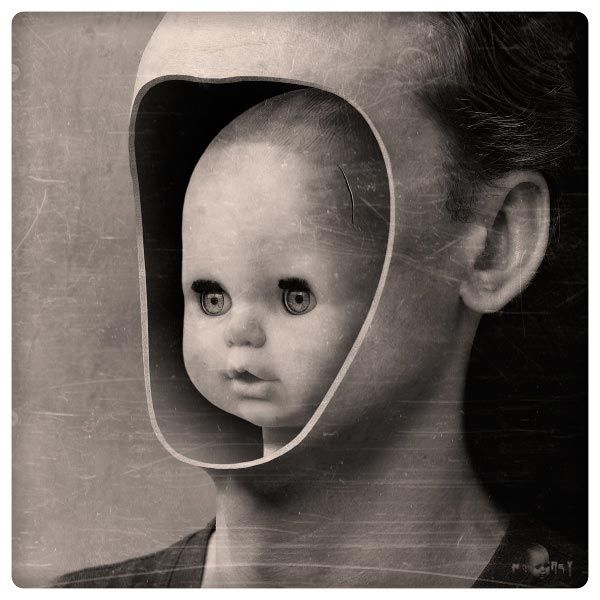 Most of the above explanations are psychological, psychopathological, or pathological. Voices in the head are said to be a mental illness, a disturbance of perception, and auditory hallucinations. Psychologists and psychiatrists claim this, even though they have no evidence that voices in the head are a mental illness.
Most of the above explanations are psychological, psychopathological, or pathological. Voices in the head are said to be a mental illness, a disturbance of perception, and auditory hallucinations. Psychologists and psychiatrists claim this, even though they have no evidence that voices in the head are a mental illness.
Hearing voices in your head is not a mental illness, a perceptual disorder, or auditory hallucinations. People who hear them hear people speaking, but they cannot see them because they are in a higher dimension. These people who are close to people who hear “voices in their heads” are people from other planets.
They are karmic agents, members of the Evil Karmic Organization, who are with us from birth to death. They make sure that the karmic scenarios for our incarnants, people from other planets, are carried out according to plan.
The Black Cloud, a visitor from a higher part of our universe, added that the karmicons have unknowingly presented themselves as mentally ill. They deliberately hid the fact that the “voices in the head” were their workers and falsely presented them as a “mental illness.” In reality, they are the mental illness, the virus, the parasites and predators, the psychopathic sadists, the pests, the destroyers, the torturers, and the murderers.
Important Revelation: Supernatural Phenomena as Karmic Programming
The karmicons have pre-created entire lives for all people on the planets, from the first to the last thought, word, and deed.
This means that all “supernatural” phenomena are programmed. This also applies to “voices in the head,” “hallucinations,” “spiritual visions,” and “miracles” of all kinds.
Most Earthlings do not see them because they are in a higher dimension. I see them as if in semi-darkness.
I currently have nine of them, seven outside of me and two inside me. Four are the karmicons, three outside and one in my head.
Five are civilians who have no connection with the karmic servants, but are people from other planets.
Three are from the middle cosmos and two are from our part of the cosmos. Jac is from the planet Palki, and I do not know the name of Zlatko’s planet, a boy who is also in my head.
It is important to know that there are also channeled messages – there are thousands of them on Earth, even religious books such as the Torah, the Bible, and the Koran were created with channeled messages – “voices in the head” communicated by the karmicons.
Channelers believe that various “gods, angels and ascended masters” dictate messages to them from the distant “other side”. In reality, the karmicons read pre-written texts to them from two meters above them.
Read more about the karmicons in my article The Karmic Organization and the Karmicons: Conspiracy Theory or The Truth?, my other articles, and books.
Hearing voices in your head cannot be treated or cured

The karmicons are evil creatures who mocked people, tortured them, and enjoyed their suffering. Healing the voices in one’s head is just another form of karmic black humor, as they knew very well that it could not be cured.
Simply, no illness, no cure. Just a talk.
How could they “cure” a person who speaks to another person so that the latter would no longer hear them?
Earthlings who hear voices in their heads hear the karmicons, other humans. They do not hear them with their physical ears, but with their energy body. The karmicons are not in physical bodies and are not in our physical world. Their speech does not cause physical stimuli in the ears. Consequently, humans hear their voices in their heads as an energy wave that our energy body feels and “hears.”
The only way to “cure” the voices in the head is to silence the karmicons who speak them. Due to the blockade of the planet, this is not yet possible, so we will continue to hear them.
How to stop the voices in your head?
Let’s see what the karmicons advise people who hear them on how to treat and heal the voices in their heads.
“If you have schizophrenia and you hear voices, know that it’s not uncommon for people with the condition. Up to 80% of people diagnosed with schizophrenia have this symptom, too.
Doctors call them auditory hallucinations. It’s as if someone is speaking to you, but they’re not actually there. The voices feel very real and can be distracting and stressful. This can affect your overall quality of life. In severe cases, these voices may trigger thoughts of suicide or violence.
What Treatments Can Help With Hearing Voices?
Prescription medications and talk therapy can help.
Medications. Antipsychotic medications are commonly prescribed for schizophrenia and can help in a number of ways. The drugs can:
- Lessen the urge to interact with voices or listen to them
- Help you ignore some of the criticism you may hear
- Make the voices less frightening
- Make the voices less intrusive or “in your face.”
Cognitive behavioral therapy (CBT). This is when a mental health professional helps you work through what the voices mean, how they make you feel, and how they control what you think about yourself.
CBT can:
- Lessen anxiety about hearing voices
- Help you stand up to them
- Help you build control over the voices
Repetitive transcranial magnetic stimulation (RTMS). It’s a painless, noninvasive procedure in which an electromagnetic coil is placed on your scalp near your forehead. The coil sends magnetic pulses that stimulate nerve cells in this area. Experts are not entirely sure how it works, but they think it affects the regions of your brain that control mood and depression. Research suggests RTMS sessions can help make the voices appear less often and make them less intense. It may even keep voices at bay for up to 3 months after treatment. More research is needed.
What Are Some Self-Help Tips for Schizophrenia?
Ways you can try to control the effects of voices include:
Find distractions. Staying busy or focusing on something else to keep your mind occupied may help. This might drown out the voices or distract you from them.
Options include:
- Puzzles or games
- Listening to music
- Reading a book
- Watching TV
- Writing
- Household chores
Try out a few different things to see what works best for you.
Call 911 or head to the nearest hospital if the voices get too strong, mean, or dangerous.”
Source: Schizophrenia: Hearing Voices and How to Manage Them, https://www.webmd.com/schizophrenia/schizophrenia-hearing-and-managing-voices
Call 911 to stop the supernatural creatures’ freak show
“Call 911” is another karmicons’ joke as the police could silence or arrest the invisible karmicons, for whom they don’t even know they exist. The doctors can’t stop them either.
First drugs, and then talk.
The only thing they can do is to knock you out with strong sedatives. But, when you wake up, the karmicons are already waiting for you with the new episode of the “Voices In Your Head” Horror Show.
Another joke is RTMS.
“Experts are not entirely sure how it works”, but they will heavily charge you anyway.
What kind of “experts” are they if they don’t know how it works?
Despite their ignorance, they will “even keep voices at bay for up to 3 months after treatment”.
Ha, ha, ha.
Like the magnetic pulses could somehow impact and influence the karmicons who are just laughing at experts and patients alike. As soon as they shut down the machine, they will continue with the “voices”.
Some people try to silence the voices in their heads with white noise (the humming of radio or TV stations), deliberately speaking loudly, loud music, mantras, and even shouting. It can help to deflect the karmicons’ voices, but then they hear new sounds that can also be very unpleasant.
Important Example of Karmic Dark Satire: Hearing Voices in Your Head is a Gift
Here is another example of karmic black humor, in which voices in the head are recommended as something that can even improve the human experience.
“A person may understand their voices as a kind of gift; as an enriching of their human experience. The voices may ensure they are never lonely. People may even understand the voices as a spiritual phenomenon; an expression of their soul or angels.
The common theme here is the idea that voices don’t have to be stigmatised, medicalised experiences. They may be related in a variety of ways.
And, perhaps surprisingly, the voices can often even be managed. A person may talk to their voices, respond to their voices. They may form an agreement with their voices that the voices will be given a certain free time to emerge, but will be quiet the rest of the time. They may discover that the voice does not have control over them or their actions.”
Source: On Hearing Voices, https://www.onedoor.org.au/news-updates/blog/blog-on-hearing-voices
I am laughing today, and you will join me in the future when you learn the truth about the karmicons and how they mocked us.
You can not heal hearing voices in your head

Hearing voices in your head isn’t a classic illness, so you can’t fix them with pills or other therapies. Karmic guys are like prompters in the theater. At a certain time and opportunity, they say something, either helpful or harmful. Sometimes they can even speak up on their own, like they do with me.
The only way to permanently silence the “voices in our heads” is to remove the karmicons from your side.
Another option is that they will fall silent on their own due to orders they received before their arrival. They have been ordered to speak for a certain amount of time, and then they will fall silent.
After the end of the planetary blockade, we will remove them all and thus silence the “voices in the head” forever.
Call To Action: What can you do until the liberation of the planet and the removal of the karmicons?

It is important that you are well informed, stay calm, and know that the voices in your head are the karmicons. Don’t be afraid of them – they are just harmless voices – and you do not carry out harmful orders.
Be calm, listen to them if you want, write their messages down, but do not answer them.
If you start a conversation, they will speak with you more frequently, and at times you won’t like.
It is important that you don’t fight with them, threaten or curse them. They could have a special technology, and severely harm your body at a distance if you provoke and make them angry.
It will be very beneficial for you to awaken to Pure Awareness, abandon the old, and create a new personality. After awakening, you will still hear the “voices in your head” because the karmic agents will still be around us.
The difference is that you will no longer fear them and carry out their commands. You will know who they are and what they want from you.
Types of voices in the head: the true and the false ones
For those who are awakening to Pure Awareness, let me introduce the division between true and false voices in the head.
True voices are the karmic ones, as they are spoken by real people who are two or three meters above and in front of us.
False voices belong to the partial personalities of an unawakened person, who is fragmented into numerous false personalities.
The unawakened person does not yet have a true, unified, and complete conscious personality, but rather a false or para-personality. The unawakened and unaware person is just a karmic puppet for the planetary theater play or a living costume for his incarnate, a person from another planet.
Partial personalities are split parts of the personality that fight each other for survival.
We can divide them into two large groups, the Important and the Poor. The former imagines that it is worth more than others, while the latter feels sorry for itself, as it is convinced that it is worth less than others.
Let me add conscience (the psychoanalytic Super Ego) to this division. In our minds, we may occasionally, frequently, or constantly hear the repetitive statements of our parents and others, as well as their commands, prohibitions, rules, and advice.
People with PTSD (Post-Traumatic Stress Disorder) may hear voices in their heads from traumatic events in the past.
Important Insight: Pre-Programmed Voices and the Awakening Process

It is important to know that all voices in the head are planned, created, and programmed in advance, even a hundred or more years before your birth.
During the awakening to Pure Awareness, we gradually eliminate all partial personalities and create one new and healthy personality. Awakened people may occasionally still hear karmic voices, but we recognize them as such and do not take them seriously. If they advise us on something useful, we use it. If they persuade us to do harmful things, we do not listen to them.
I should add that some voices in our heads are not harmful, as they can be useful to us in life. They may be good in the small picture, but in the big picture, in terms of karma and our entire life, they are bad because they do not help us avoid physical death and survive energetically.
Important Disclosure: You Were Never Meant to Know the Truth about Hearing Voices in Your Head
Let me also tell you that, according to the karmic plan, you would never have found out who the “voices in your heads” are. The karmicons didn’t plan their full disclosure to humans because they saw us just as puppets and not real beings.
This is another of the many disclosures that I am presenting publicly for the first time in the history of the planet.
The most important revelation is that the Karmic Organization exists or existed. Another important revelation is that, according to their plan, you are not a real person at all. For the karmicons, you are just a live costume for your incarnant. He or she is a human from another planet who was forced to incarnate into your baby body at your birth.
The good news is that we have already abolished the Karmic Organization, and in the near future, you too will become a free and independent human being.
With my exercises for awakening to Pure Awareness, you can already significantly change your karmic scenario, prepare for the liberation of the planet, and the relocation to the new planets.
Fantastic future after the end of the Earth’s blockade

Read more about the work of the new Cosmic Administration, the end of all religions, and the awesome future of Earth after the end of the planetary blockade in my new Book Series:
“It’s finally PROVEN! God Does NOT Exist The FIRST valid EVIDENCE in History”.
After millennia of speculation, assumptions, and false beliefs, we now have irrefutable evidence: God Does NOT Exist because that is impossible.
The Biggest SECRET in Human History is Finally REVEALED. The truth will liberate atheists from religious and right-wing hatred, violence, and terror. It will help believers sober up, escape their religious delusions, and live in common sense.
You deserve to KNOW.
Share And Recommend:
Feel free to share this powerful article with any blogs or platforms you trust. They’re welcome to republish it with the credit: “This article was originally published at https://god-doesntexist.com/hearing-voices-in-your-head-mental-illness-and-hallucinations-or-gods-and-demons/
Related articles, exercises, and instructions:
Learn to lucid dream, meet the inhabitants of other planets, and check and confirm my statements in Lucid Dreaming for Space Travel: Exploring Real Planets in Dreams
Read more about the Karmic Organization and the Karmicons, Cosmic Administration
and the fantastic future in my articles library at Beyond The Matrix, and join the Partnership For Earth Without Religion.
Calling all freethinkers, skeptics, and awakened minds!
I’ve just launched r/NeoAtheism: A new Reddit community dedicated to bold atheist thought, personal transformation, and fearless truth-seeking.
Check out our first three posts:
1️⃣ Meet Senad — Author of 12 Books, Visionary behind NeoAtheism
2️⃣ Welcome Guide — What We Explore & Why It Matters
3️⃣ Resources Hub — Articles, Tools & Sites for Deprogramming Belief
Join the Atheist Revolution of Reason and Clarity.
https://www.reddit.com/r/NeoAtheism/
Let’s wake up the world, one mind at a time.

